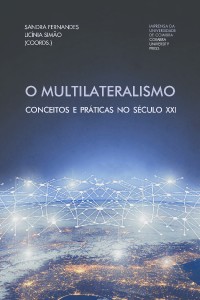Please use this identifier to cite or link to this item:
https://hdl.handle.net/10316.2/47532| Title: | As relações União Europeia-Rússia: uma prática de multilateralismo multinível | Other Titles: | EU-Russia relations: a multi-level practice of multilateralism | Authors: | Fernandes, Sandra | Keywords: | European Union;Russia;multilevel multilateralism;União Europeia;Rússia;multilateralismo multinível | Issue Date: | 2019 | Publisher: | Imprensa da Universidade de Coimbra | Abstract: | The chapter analyses the external action of the European Union (EU) and
its production of multilateral forms of interaction, particularly in relations with Russia. Since
2003, Brussels has pursued “effective multilateralism” as a way of interacting with third parties
in order to promote global governance under its values and those of the United Nations.
We argue that three distinct levels of multilateralism coexist and that they explain the tensions
of this multilateral relationship. (1) The existing institutional cooperation framework
between the EU and Russia is unique, including its intergovernmental dimensions, and
produces results that are not realised in other formats. (2) The national level interferes with
the former, insofar as Member States weigh heavily, both formally and informally, in the
internal dynamics of the EU and because the multilateral level may be unavailable to certain agendas. (3) The two actors interact in a more global framework, participating in several
international organisations (UN, OSCE, Council of Europe, WTO) that prescribe behaviours
and provide frameworks for the EU-Russia relationship itself. Este capítulo tem por objetivo analisar a ação externa da União Europeia (UE) e a sua produção de formas multilaterais de interação, em particular nas relações com a Rússia. Bruxelas almeja, desde 2003, a um “multilateralismo efetivo”, como forma de interação com terceiros, de modo a promover a governação global, os seus valores e das Nações Unidas. Argumenta-se que coexistem três níveis distintos de multilateralismo onde ocorrem tensões explicativas do modelo de relacionamento UE-Rússia que se apresenta como multilateral. (1) O quadro de cooperação institucional existente entre a UE e a Rússia é único, incluindo nas suas dimensões intergovernamentais, e produz resultados próprios não alcançados noutros formatos. (2) O nível nacional interfere com o anterior na medida em que os Estados membros pesam, formal e informalmente, nas dinâmicas internas da UE e porque o nível multilateral pode estar indisponível para certas agendas. (3) Os dois atores atuam num quadro mais global, pertencendo a organizações internacionais (ONU, OSCE, Conselho da Europa, OMC) que prescrevem comportamentos e fornecem regimes enquadradores da própria relação UE-Rússia. |
URI: | https://hdl.handle.net/10316.2/47532 | ISBN: | 978-989-26-1750-3 (PDF) 978-989-26-1749-7 |
DOI: | 10.14195/978-989-26-1750-3_6 | Rights: | open access |
| Appears in Collections: | O multilateralismo: conceitos e práticas no século XXI |
Files in This Item:
| File | Description | Size | Format | |
|---|---|---|---|---|
| as_relacoes_uniao_europeia-russia.pdf | 758.07 kB | Adobe PDF |  |
Items in DSpace are protected by copyright, with all rights reserved, unless otherwise indicated.
